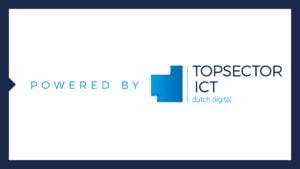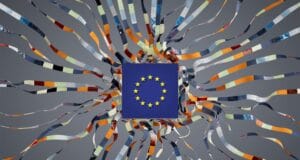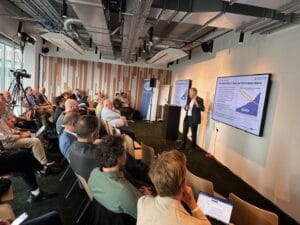In June, our Community Meeting was focused on the topic of EU Digital & AI laws. For this event, we collaborate with the VNO-NCW and we offered an exploration into the Digital and AI laws of the European Union, their impact and how you can get started with AI within your organisation. In case you were unable to attend the sessions live, you will find the key take-aways, recordings and slides in this article.
Who and what of the AI Act
Irvette Tempelman (VNO-NCW) gave insights into the who and what of the AI Act. Her key take-aways are:
- Not everything in the AI Act is yet clear or easy to implement.
- The focus in the coming period will have to be on effective and efficient implementation of the legal rules in practical business processes.
The transformative benefits of AI for entrepreneurs and journalists
John Wittmaekers (Concept7) talked about storytelling and how AI can help entrepreneurs better share their brand story with their target audiences. John discussed the transformative benefits of AI for entrepreneurs and journalists alike, and explained how the innovative YourStoryz app can enhance content creation. From creating compelling brand stories to delivering real time news, attendees discovered how AI-powered tools can streamline processes and engage their audience like never before. His key take-aways are:
- Unlock financial support: the EU AI Act offers substantial funding to foster innovation, helping SMEs develop cutting-edge AI technologies and applications.
- Build credibility with standards and certification: EU AI standards and certifications enhance your business’s credibility and marketability.
- Navigate a fairer Digital Market: the Digital Services Act ensures easier market access for SMEs, with clearer liability protection rules.
- Promote fair competition: the Digital Markets Act reduces barriers imposed by larger ‘gatekeepers’, promoting a more competitive market environment for SMEs.
- Harness the power of content: video content is a game-changer for business growth. It can boost lead generation, help enhance engagement and SEO, help build brand awareness and authority, and help reach new audiences.
- AI in content creation: AI tools revolutionise how we create content by offering more efficiency and consistency.
EU digital legislations and the implications for SMEs
Olga Batura (TNO) discussed the EU digital legislations and the implications for SMEs. She provided an overview of the recently adopted EU-level legislations in the area of the digital economy – including the Digital Services Act, Digital Markets Act, Data Act, and the AI Act – discussed the relevance of these legislations for SMEs and their business, and what impact they may have. Her key take-aways are:
- In the last few years, the EU showed a very high legislative activity in the field of digital, adopting many complex legislations in data governance, digital markets and services, cybersecurity and AI. SMEs across the EU are likely to experience serious difficulties in understanding these new legislations and complying with them, which will impact European competitiveness.
- While the ultimate responsibility for compliance is on SMEs, the government at all levels must support businesses more in navigating this complicated legislative landscape.
- SMEs would be well advised to seize various available opportunities. For example, they should pay attention to implementing acts and various guidance documents coming from the European Commission and specialised EU-level bodies. If possible, they should participate in regulatory sandboxes to be established by national governments under the AI Act and the Cyber Resilience Act and monitor their outcomes.
- And they should take advantage of the existing industry fora, such as the Centre of Excellence for Data Sharing & Cloud, the AI Coalition, and others.
How to get started with AI within your organisation
Nick Moesker (DataNorth) discussed the European AI Act. He believes it is a guideline, but no showstopper for the successfull application of AI. Many organisations know that the AI revolution is in full swing, but what are the first steps they should take? DataNorth is an expert in supporting organisations through inspiration, assessing AI opportunities, developing Proof of Concepts and creating custom solutions. There are numerous opportunities to implement powerful and effective solutions within the rules of the AI Act. What are these solutions? And how do you get started with AI within your organisation? His key take-aways are:
- We are currently experiencing an AI Boom, a long period of ongoing breakthrough and strong development of AI. Therefore, it is a comforting thought to have the AI Act in place to govern AI developments.
- The EU AI Act does not mean, however, that it will hinder the development and implementation of AI within most organisations. Many organisations are still at the early phase of adopting AI, and many valuable use cases for organisations will fall into the minimal or limited risk categories, having very minimal impact on the successful implementation.
- DataNorth recommends to keep inspiring yourself and our organisation by following the step-by-step approach: get inspired with use cases and tools, practice with AI tools, shape an AI roadmap, conduct Proof of Concepts, develop successful AI driven applications, and finally turn these efforts into a organisation-wide AI transformation programme to leverage opportunities while taking into account AI Act regulations.
Identity Management was the topic of our Community Meeting of April.
Click for the recordings and sessions
Digital Product Passports was the topic of our Community Meeting of May.
Click for the recordings and sessions





